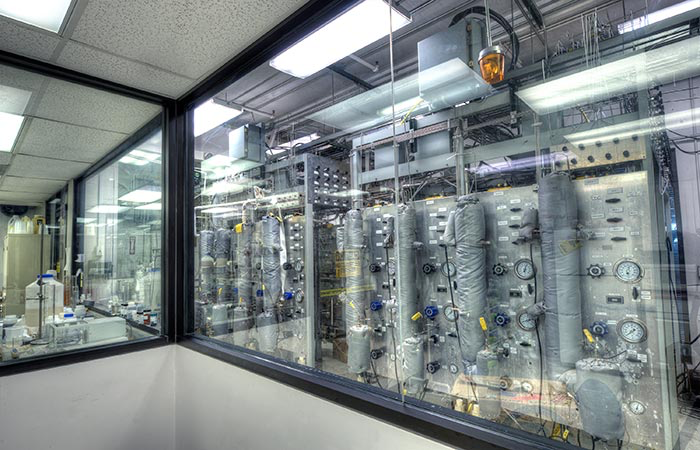Lab/Analytical Services
Lab Services
Research and Development Lab
Emerging Fuels Technology (EFT) operates a catalyst and process development facility in Tulsa Oklahoma. Originally built to test and develop Fischer-Tropsch catalyst, the EFT R&D Lab has been upgraded with several modifications that greatly expand its capabilities allowing it to serve as a platform for catalyst and process development for a range of alternative and renewable fuels programs. EFT has conducted numerous confidential catalyst testing and/or development programs for third parties all over the world. We have also produced numerous finished product samples from feedstock provided by our clients (example: Jet fuel from algae oil). The R&D Lab is fully staffed and operational and can be producing results for your development program immediately. A description of the equipment and operations available is given below with a few ideas with respect to how they can be used. The facility operates on a 24/7 basis and all our reactors can run in an uninterrupted manner from weeks to years.
.

Fixed Bed Reactors – EFT has 19 fixed bed reactors designed to operate with up to 10cc of catalyst. Each reactor operates with multiple feed gas options and can operate up to 700 psig and up to 750° F. Select reactors can operate up to 1,000 psig and 750° F. These reactors are ideal for catalyst screening runs, catalyst aging studies, kinetic modeling studies, contaminant studies and process/procedure development. These reactors are equipped with automated sampling to a Gas Chromatograph (GC) for feed and exit gas analysis. Custom software combines process data, GC data and generates calculated data (conversion, selectivity to various products, partial pressures, reaction rates and more).
Catalyst – EFT can prepare custom catalyst samples and provide support for commercial scale-up. Catalyst development tools include: surface area and pore size measurement, TPO/TPR, hydrogen chemisorption and support preparation including: extrusion, impregnation, calcination and precipitation.
CSTRs – Any fixed bed reactor station can be configured with a Continuous Stirred Tank Reactor (CSTR) for slurry catalyst operation. EFT has developed several methods to evaluate fundamental kinetics and catalyst attrition.
Hydroprocessing – Any fixed bed reactor in the EFT R&D Lab can be operated in a trickle bed mode for hydrocracking or hydroisomerization. EFT can operate in the hydroprocessing mode up to 1,000 psig at any given hydrogen feed rate. EFT has experience with hydroprocessing a broad range of feed material including: FT waxes and oils, crop oils, seed oils and algae oils. Small fixed bed reactors operate at nominal rates of 1 liter per day. EFT has two larger trickle bed reactors that operate at a nominal rate of 1 gallon per day, and two that operate at a nominal rate of 3 gallons per day up to 2,000 psig.
High Temperature Reactors – The EFT facility has four high temperature reactors (up to 900° C) that can be used for steam methane reforming, CO2 reforming, pyrolysis, torrefaction and other high temperature reactions.
Fixed Bed Pilot Plant – EFT has a steam-cooled fixed bed tubular reactor with multiple tube size options from ¾” to 3“. This unit is configured with a recycle compressor, one or two multipoint thermocouples (depending on tube diameter) for axial temperature profile and steam pressure control for accurate scale-up of fixed bed reaction applications. This system operates at conditions (including gas linear velocity) very similar to commercial conditions. Besides the catalytic performance data, the system also provides data on the reactor thermal stability and overall heat transfer coefficient at the chosen set of conditions. The reactor can be operated at isothermal or adiabatic conditions. The system can be configured for single or multistage operations. Other reactants or intermediates can also be added to the feed.
Distillation – EFT has two spinning band distillation columns, one short path distillation unit, and one large packed bed column. Distillations can be coupled with hydroprocessing to produce intermediate or finished naphtha, jet, and diesel product samples to support product development and blending studies.
Analytical – Product analytical tools include: low temperature simulated distillation, high temperature simulated distillation, Paraffin-Olefin-Alcohol analysis, alcohols in water and iso/normal ratio by GC. The lab is also equipped to measure product’s physical properties such as flash point, pour point, viscosity and ASTM D1160 distillation.
Consulting – EFT employees have a broad range of experience in alternative and renewable fuels and catalytic processes and can provide consulting services for technology review, catalyst performance evaluation, Patent search and freedom to operate, expert witness and more. EFT can also provide consulting in the areas of high temperature processes or reactor design such as gasification, reforming, and partial oxidation. Our senior staff also has extensive knowledge in refinery operations involving hydroprocessing and catalytic cracking.
EFT can also provide assistance with certification of synthetic paraffinic kerosene fuels under ASTM D7566 as well as assist with understanding and meeting other ASTM specifications such as D975 Diesel Fuel, D396 Fuel Oil, D4814 Gasoline, D1655 Jet Fuel, and other ASTM tests and specifications.
Analytical Services
FT has the equipment and the trained staff to provide analytical support for catalyst development, reactor testing and upgrading-related activities. We have the analytical tools to evaluate catalyst supports for pore size, surface area, hydrogen and carbon monoxide chemisorption and thermo gravimetric coupled GC/MS capability to develop temperature programmed reduction and oxidation profiles. EFT has developed a series of GC-FID based methods specifically calibrated to target product components generated by FT and mixed alcohol synthesis chemistry. Physical properties of hydrotreated/hydro processed hydrocarbons can be determined using a variety of ASTM referenced methods including high (D-6352) and low (D-2887) temperature simulated distillation, flash point (D-93), viscosity (D-445) and micro distillation (D-86).